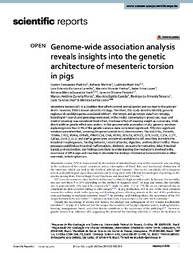Genome-wide association analysis reveals insights into the genetic architecture of mesenteric torsion in pigs.
Genome-wide association analysis reveals insights into the genetic architecture of mesenteric torsion in pigs.
Autoria: PADILHA, S. F.; MARTINS, R.; HUL, L. M.; CARREÑO, L. O. D.; FREITAS, M. S. de; LOPES, J. S.; IBELLI, A. M. G.; PEIXOTO, J. de O.; MORES, M. A. Z.; CANTAO, M. E.; TEIXEIRA, R. de A.; DIAS, L. T.; LEDUR, M. C.
Resumo: Mesenteric torsion (MT) is a condition that affects several animal species and can lead to the animals’ death. However, little is known about its etiology. Therefore, this study aimed to identify genomic regions and candidate genes associated with MT. Phenotypic and genotypic data from 405 pigs, including MT records and genealogy were used. In the model, contemporary group (sex, year, and week of weaning) was considered fixed effect, the linear effect of weaning weight as a covariate, while direct additive genetic effect was random. In the genome-wide association study, genomic windows explaining more than 0.3% of the genetic variance were considered significant. Fifty-two significant windows were identified, covering 299 genes located on 15 chromosomes. The HSD17B4, TNFAIP8, TENM4, CHD2, RGMA, OPRM1, PPARGC1A, CHIA, KCNJ2, KCNJ16, KCNJ15, ELN, SGO1, IL17A, IL17F, GATA4, OVOL2, GLI3, and RAP1A genes were considered candidates to MT since they are related to intestinal morphogenesis, feeding behavior, intestinal barrier, digestion, and intestinal motility. These processes could induce intestinal malformations, dysbiosis, excessive fermentation, delay intestinal transit, and obstruction. Our findings contribute to understanding the mechanisms involved in the occurrence of MT in pigs and may help to elucidate the etiology of intestinal torsion/volvulus in other mammals, including humans.
Ano de publicação: 2025
Tipo de publicação: Artigo de periódico
Unidade: Embrapa Pecuária Sudeste
Palavras-chave: Death, Finishing, Genoma, Genética Animal, Nervous system, Porco, Secretion, Volvulus
Observações
1 - Por padrão são exibidas publicações dos últimos 20 anos. Para encontrar publicações mais antigas, configure o filtro ano de publicação, colocando o ano a partir do qual você deseja encontrar publicações. O filtro está na coluna da esquerda na busca acima.
2 - Para ler algumas publicações da Embrapa (apenas as que estão em formato ePub), é necessário ter, no celular ou computador, um desses softwares gratuitos. Sistemas Android: Google Play Livros; IOS: iBooks; Windows e Linux: software Calibre.
Acesse outras publicações
Acesse a Base de Dados da Pesquisa Agropecuária (BDPA) para consultar o acervo completo das bibliotecas da Embrapa.

